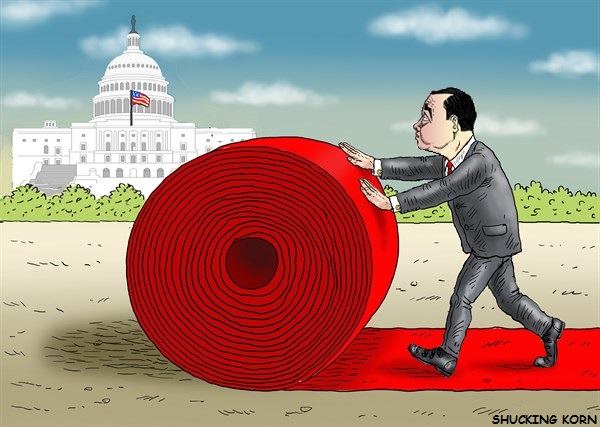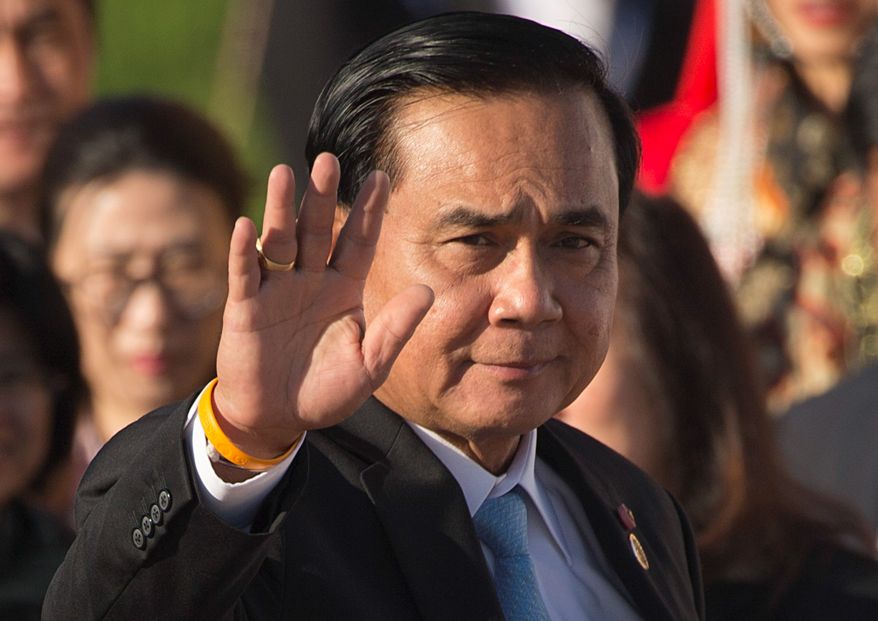Trump Invitation Will Help Thailand’s Authoritarian Leader Fend Off Domestic Opposition
by
May 2, 2017
Invitation: Thailand Prime Minister Prayuth Chan-ocha received an invite from President Trump to visit the White House. Former President Barack Obama kept the Thai leader at bay during his administration. (Photo: Associated Press/Mark Schiefelbein)
He’s no Rodrigo Duterte, but like the more outspoken Philippines president, Thai Prime Minister Prayuth Chan-ocha now has a personal invitation to the White House from President Trump and a clear path to come in from the cold with Washington three years after seizing power in a military coup.
Mr. Prayuth, the former Army commander who recently pushed through a new constitution that strengthens his hold on power, had faced frosty relations with the Obama administration but received a surprise invitation on Sunday from Mr. Trump, a day after the new U.S. president made the same offer to Mr. Duterte. Human rights advocates have criticized both offers, but Mr. Trump has shown a readiness to work with authoritarian leaders around the globe to further American security interests.
Mr. Prayuth readily accepted the invitation, and his supporters are already saying it has enhanced his legitimacy as a leader and solidified his political base.
“Trump’s invitation is a positive move,” said Kasit Piromya, a member of the military government’s National Reform Steering Assembly.
The visit will give Mr. Prayuth “respectability and legitimacy in the eyes of the Thai conservatives, ultraright wing, upper-middle class and the elites,” Mr. Kasit said in an interview Tuesday.
Mr. Trump’s outreach will be welcomed by the Prayuth government in part because it is a sharp U-turn from the treatment received under the previous administration, Thailand-based British historian Chris Baker said.
“Prayuth and other members of his government, and their supporters, have been embarrassed and [are] angry at the refusal of the USA to appear supportive of their coup-installed regime,” said Mr. Baker. “They will now be jubilant.”
The prime minister said Tuesday he expects to enjoy a much-needed boost thanks to Mr. Trump’s offer.
“The U.S. president said that we are their good ally, and he assured me that, although we have been rather distant recently, Thai-U.S. relations will now be closer than ever,” Mr. Prayuth told reporters on Tuesday, according to the Reuters news agency.
Mr. Trump reportedly extended the invitations to Mr. Duterte and Mr. Prayuth without informing the State Department. The U.S. Embassy in Bangkok has yet to comment on the invitation, and there is no mention of it on the embassy’s official website.
In his Sunday phone call with Mr. Trump, Mr. Prayuth “affirmed that Thailand stands ready to support and promote bilateral cooperation in all fields, particularly trade, investment and security,” announced Deputy Government Spokesman Lt. Gen. Werachon Sukondhapatipak.
Mr. Prayuth will “support the constructive role of the United States in maintaining peace and security in the region,” Lt. Gen. Werachon added.
Mr. Prayuth has also invited Mr. Trump to come to Bangkok. No dates were announced for either visit, though Mr. Trump is scheduled to be in the region for summits in the Philippines and Vietnam in November.
Record questioned
Thailand is a longtime U.S. ally, and Mr. Prayuth has not sparked nearly the international outrage of Mr. Duterte, who personally insulted Mr. Obama, spoke of forging closer ties with China and Russia and spearheaded a harsh and at times violent crackdown on drug dealers that international human rights groups have sharply condemned.
But the government in Bangkok has faced its own questions over civil liberties and the treatment of political opponents. Mr. Prayuth’s military-dominated government has not allowed this Buddhist-majority Southeast Asian country to hold elections, freedom of speech or other basic rights since he seized power in the bloodless 2014 coup when he was army chief.
Mr. Prayuth was never invited to Washington under Mr. Obama, and the U.S. military scaled back its participation in the massive annual military exercises that were seen as a symbol of the depth of the bilateral relationship. The strains reached a climax in 2015, when U.S. Ambassador Glyn Davies was briefly investigated on charges of insulting the king when he raised questions about the government’s record in a speech.
But with the Trump administration concerned about the increasing sway of China and the crisis on the Korean Peninsula, a Prayuth visit to Washington could have some uncomfortable moments as well, Mr. Kasit said.
“However, Prayuth will have to give a lot of explanations” about why he is “too friendly and too complying with Beijing’s wishes,” Mr. Kasit said. Thailand has deepened military ties with China since Mr. Prayuth took power, with Bangkok recently announcing it has purchased the first of a planned three-submarine deal from Beijing.
Mr. Baker said the Trump administration’s move will not necessarily mean new popular support for the prime minister and his government, but will give Mr. Prayuth more leeway to ignore his domestic critics.
“Trump’s invitation will not correct this slide in popularity, but will induce the generals to ignore it,” said Mr. Baker.
Human rights and democracy activists have been quick to denounce the U.S. invitations to both Mr. Duterte and Mr. Prayuth.
“Turns out Trump to welcome not only execution-promoting Duterte but also democracy-crushing Prayuth, Thai junta chief,” New York-based Human Rights Watch Executive Director Kenneth Roth wrote Monday on Twitter.
The English-language Bangkok Post editorialized that the proposed visit “makes a dramatic change in tone from the former administration of Barack Obama which, despite giving much attention to Asia, refused to afford such prestige to [Prayuth], the leader of a non-elected government.”
Mr. Prayuth’s visit to the White House will be the first official trip by a Thai premier to Washington since 2006, when then-Prime Minister Thaksin Shinawatra was toppled in a coup while visiting the U.S.
While never invited to the White House, Mr. Prayuth has twice visited the U.S. as prime minister, attending U.N. General Assembly meetings in New York and as part of a delegation of Southeast Asian leaders with Mr. Obama in California in February 2015.
This article originally appeared on Washington Times.

